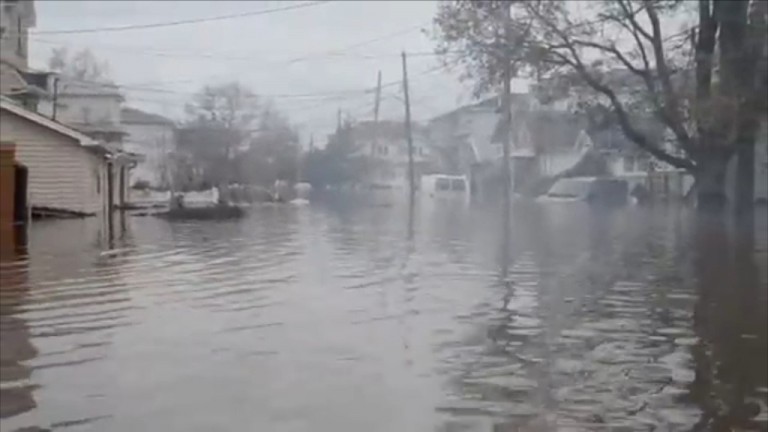PHOTO: The new Frontline report “The Business of Disaster” focused on the aftermath of Superstorm Sandy. Courtesy of PBS
By Michael V. Cusenza
If government malfeasance, rampant and blatant violations of the public trust, or greed at the expense of the downtrodden make you want to put your fist through water-logged sheetrock, then stay away from the Frontline/National Public Radio special report “The Business of Disaster.”
The piece, which debuted on Tuesday night, takes a look at what happens when the wind and rain die down and it’s time to assess the damage. Specifically, reporter Laura Sullivan examines the aftermath of Mother Nature’s malevolent 2012 masterpiece Superstorm Sandy, and who stands to actually gain from another’s loss.
“My instructions to federal agencies: Cut through the red tape and bureaucracy,” President Barack Obama said shortly after the storm eviscerated parts of the city, including many south Queens communities. “Get the resources to the people that need it.”
About that “red tape and bureaucracy,” Mr. President…
“I should be at home in my house and part of my community, and instead I’m out here doing this,” said a visibly frustrated Doug Quinn, whose Toms River, N.J., home was destroyed by Sandy.
Quinn’s story is alarmingly not unique. His $250,000 flood insurance policy only paid out $90,000 – not remotely close to what he needed to rebuild his house and life.
“My back was against the wall, because I knew something was wrong,” Quinn said.
So he hired an attorney.
The report goes on to rehash the fraudulent scheme made public by whistle-blowing building engineers. Private engineering companies purposefully altered reports so as to not fully reflect the true impact and damage caused by Sandy to New Yorkers’ homes, which led to the unjust denial or underpayment of flood insurance claims. Hundreds of flood-damage reports were allegedly falsified, and both engineering firms and insurance companies were placed under investigation by the Department of Homeland Security Office of Inspector General and State Attorney General Eric Schneiderman for possible criminal conduct.
“I never saw anything worse in my entire life,” said John Houghtaling, a New Orleans attorney who previously fought the Federal Emergency Management Agency and insurance companies after Hurricane Katrina – and won (and won, and won, and won…) “They’re making up fake facts to come up with exclusions.”
As a result, federal officials announced that FEMA had agreed to reopen and review every flood insurance claim—approximately 144,000—filed by Sandy victims.
FEMA takes a beating in “The Business of Disaster.” But the agency is not alone. Insurance companies, represented here by a single spokesman, spend a prolonged period of time in the barrel during the one-hour report.
Sullivan said she pored over documents trying to figure out just how much money insurance companies clocked after Sandy, as, strangely, none of them wished to divulge their profit margin. She believes that altogether they made more than $400 million.
“They can’t begin to fathom the amount of financial wreckage they’ve created for average people,” said Quinn, who was able to get his claim reviewed – but legal fees ate up most of the adjusted payout. “It makes me angry to see these people profiting unfairly off other people’s misery. We’re average, middle-class people…and we’re in ruins.”
michael@theforumnewsgroup.com

